Cats rely heavily on their sense of smell, if you have a cat problem or an area where you don’t want cats to go then using smells that cats hate is an effective way of deterring them.
Even if you are not a cat owner yourself, you may want to know how to stop cats pooping in your garden, trampling on your vegetable patch or killing birds and wildlife.
Scents can work very well as a cat repellent, just be aware that every cat is different so while some cats will hate a certain scent another cat may love it – experiment until you get the perfect scent, or scents, that works.
Some of the scents that cats view as unpleasant may be surprising to us as we think they smell delicious, but other odors we can all agree smell disgusting.
In this article, we will run through all the smells that cats hate and why, and how we can use this knowledge to our advantage.
Contents
Why Does It Matter What Smells Cats Hate?
You may simply be curious and wish to know what smells your cat dislikes, yet understanding what makes your cat turn their nose up can also be used to your advantage.
If you have a misbehaving cat that claws your furniture, climbs your shelving, or urinates on your carpet as a pastime, you may want to know what smells they dislike to use as a deterrent.
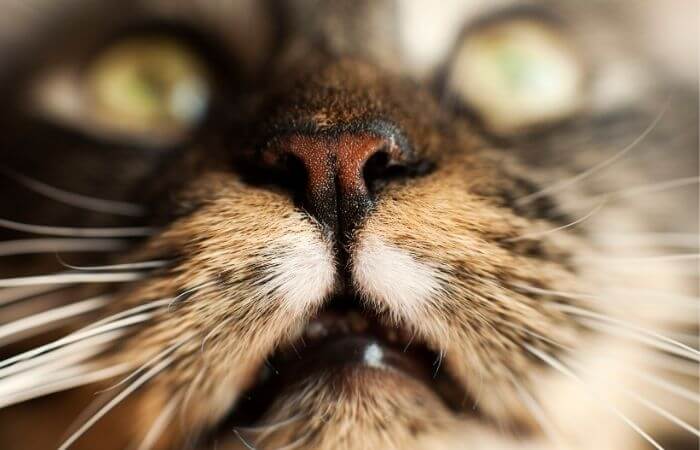
You can use these scents to discourage them from accessing different areas in your home, be that entire rooms or that favourite bookcase of yours that they love you climb.
Even if you are not a cat owner yourself, you may want to know how to keep stray cats or your neighbour’s pets out of your garden, so that they don’t trample on your vegetable patch, poop on your grass, or kill songbirds and wildlife.
Therefore, you can use smells that cats hate to keep cats out from where you don’t want them to be.
As an owner, you may also wish to know what smells cats hate to create a nice environment for them to live in where they will be happy and stress-free.
By keeping your house clear of smells that cause cats distress, you will have a better behaved and more contented cat.
Also, cats often instinctively dislike certain smells as the scents can cause irritation or harm to cats, so it is also key to keep these smells out of your home or they could have negative effects on your cat.
Surprising Smells That Cats Hate:
Some of the smells that cats hate come as a shock as they smell delicious to humans, such as refreshing citrus fruits, warming cinnamon, and cool mint.
However, because we find these scents pleasant, they make an excellent choice for cat deterrents both in the home or in your garden.
As a cat owner, it is also essential to know what smells you like but your cat hates as you may unknowingly be using scents that cause stress for your cat or even irritation.
Here is a closer look at what surprising smells cats dislike and how we can use these scents to keep cats out of our flowerbeds, from clawing our curtains, or from climbing our furniture.
1. Citrus

Cats dislike the smell of oranges, lemons, and limes, as citrus scents are extremely strong and pungent.
Although this smells pleasant to us, cats have a sense of smell that is 15 times as strong as humans, and so citrus smells are overpowering and over the top.
To discourage cats from entering your garden, a room in your home, or a particular space where they always cause mischief, try putting orange peel down.
Citrus scented essential oils can also often used to deter cats from pooping in places where they shouldn’t!
This works best in outside spaces as it doesn’t matter if the peel starts to rot, but is equally as effective in your home, as long as you replace the peels regularly to keep fruit flies at bay (some cats enjoy eating flies and this can, in rare occasions, make them ill).
Alternatively, you can buy citrus-scented cat deterrent sprays for use in the home.
If you are a cat owner and use citrus-scented cleaning products around your home, you may also wish to be careful where you use them and try to switch to alternatives where possible.
Whereas using citrus in moderation as a deterrent is fine, by cleaning all home surfaces with a citrus-scented cleaning spray, your cat could be overpowered by the scent and dislike being in your home as they are unable to find an area that doesn’t smell unpleasant to them.
This could lead to behavioural issues or your cat could run away from home.
2. Coffee

Cats are also repulsed by the smell of coffee as this too has a particularly aromatic and bitter smell which can be overwhelming for cats.
Many people have old coffee grinds in their home already from their morning cuppa, so save these up and use them to deter cats from specific areas in your home or garden.
Alternatively, collect bags for free from most local coffee shops.
Again, coffee best works outside and works particularly well sprinkled on top of the soil in your flowerbeds.
This will not harm your plants and can actually act as a fertiliser and release nitrogen to help your plants grow, but it will deter cats from trampling through your flowers or vegetables and from using your flowerbeds as a place for them to go to the bathroom.
Coffee is safe for cats and while they are overly sensitive to the effects of caffeine, the scent of coffee will not cause them any harm.
Therefore, if you’re a cat owner, you can still have your morning coffee fix without worrying about causing your cat any stress.
3. Lavender

Lavender also has a strong scent that smells divine to humans but makes cats run a mile.
You could use a lavender mist in your home to keep cats out of a specific room, such as your bedroom, but steer clear of lavender essential oils as these are toxic to cats, potentially causing tremors seizures, and breathing difficulties.
This is because cats don’t have the correct enzymes to breakdown lavender oil, and so the linalyl acetate and linalool compounds found highly concentrated in the oils can cause lavender poisoning.
Although diffusing essential oils will reduce the concentration of these compounds, it is still advisable for cat owners to limit their use when around cats, if you are going to use them then make sure you use cat safe essential oils.
Nevertheless, planting lavender in your garden could be effective in keeping roaming cats at bay.
In addition to potent lavender not smelling pleasant to cats, lavender plants also have a coarse texture that can feel uncomfortable to cats and further deter them from entering your garden.
If a curious cat does end up chewing on a lavender plant, you also don’t need to worry about causing them any harm either; whereas pure lavender essential oils are harmful, plants are safe.
4. Cinnamon

Despite us loving the smell of cinnamon, especially when there are freshly baked cookies or mulled wine involved, the scent will make cats run away.
This is another strong and aromatic smell that is too intense for cats, and whereas we feel the warmth and subtle sweet spice, cats feel overwhelmed.
According to the ASPCA, cinnamon is non-toxic to cats, which makes it an ideal deterrent that keeps cats at bay without causing any harm.
You can make a homemade cinnamon spray to keep cats away by combining cinnamon with water, black pepper, and lemon essential oil.
Spray this one the areas you wish to keep cats away from, such as along the tops of your garden fences, around your flowerbeds, or on furniture they love to scratch.
5. Mint & Menthol

Mint is from the same family as catnip, and so many people are surprised that some cats dislike mint and menthol smells.
That being said, how your cat responds to mint does depend on your cat, as some will be attracted to the nepetalactone in the mint, a compound that is also found in catnip.
For many cats though, the scent of mint is unpleasant and one that they wish to avoid, as whereas to humans menthol has a cooling effect, many cats find it harsh and abrasive.
Garden mint is actually toxic to cats with the potential to cause mint poisoning, especially in essential oil form, which can cause nausea, vomiting, diarrhoea, and overall weakness.
That being said, if you have mint in your garden or your kitchen, you do not need to worry about it causing harm as huge quantities of the plant will need to be eaten to have a severe adverse effect.
6. Rosemary
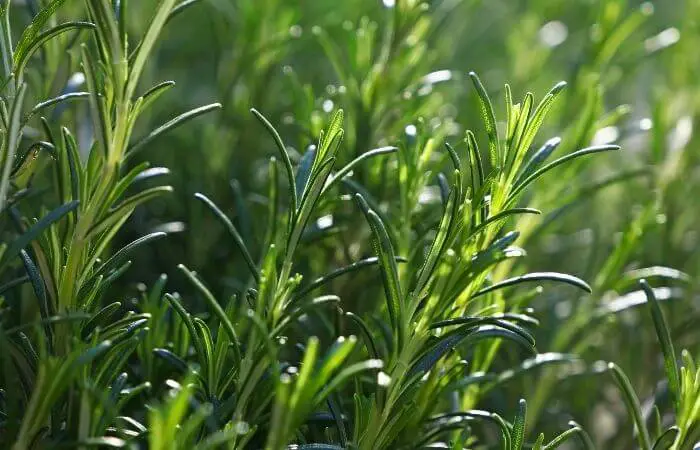
Another smell that most cats avoid is the common garden herb rosemary.
Rosemary keeps cats away for two reasons: it has a strong smell that is too pungent for cats’ sensitive noses, and it has a rough texture that cats won’t like brushing up against.
This makes rosemary an ideal home remedy for keeping cats out of your garden, and unlike some other herbs such as chives and garlic, it is not toxic.
You can also create a household rosemary spray with rosemary essential oils, water, and washing-up liquid to spray on the furniture or carpets that your cat is scratching at or urinating on.
7. Banana

Bananas are also successful in deterring cats as they hate the odours that the fruit releases.
As bananas ripen, they release the compound ethyl acetate which smells strongly of acetate, a sweet scent that the majority of cats hate.
Although this sweet-smelling fruit may smell delicious to many animals, humans included, cats are carnivores and so do not associate this with food.
Instead, the overpoweringly sweet smell makes them recoil, so try using old banana peels in your vegetable patch or flower beds to keep cats away.
Bananas also won’t cause any harm to your cat if ingested; while they aren’t a part of their diet, they are non-toxic to cats.
8. Pepper & Chilli
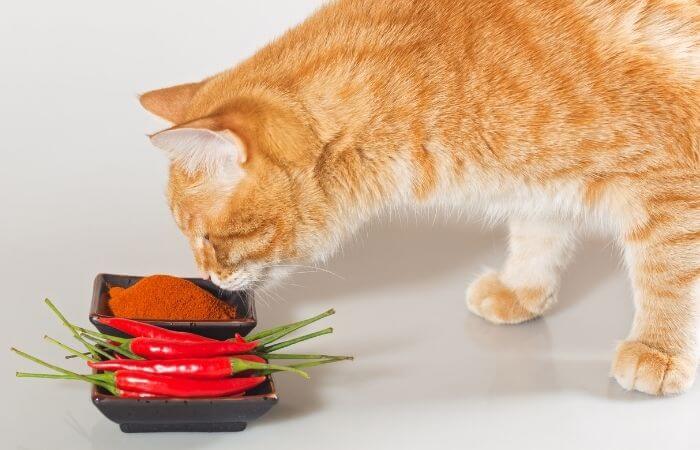
Spicy food such as pepper, chilli, and even mustard and cumin can make cats flee, as to them, these foods smell toxic.
All spicy foods contain alkaloids that affect the animal’s nervous system when ingested, humans included, which is why this food tastes spicy and makes us feel like our mouth is hot.
However, to cats, consuming a lot of spicy food can be toxic, which is why they think peppers and chilli smell disgusting; their instincts are protecting them from harming themselves by eating something they shouldn’t.
You can sprinkle chilli flakes or cayenne pepper in your flowerbeds to deter cats, as well as other animals, but this is one of the more cruel methods.
Even if cats don’t eat the pepper, it can attach to their fur and paws as they slink around your garden.
When cats next self-groom, the pepper flakes can get into the cat’s eyes or nose and cause irritation and a burning sensation, similar to how your eyes would sting if you rubbed them after chopping up a hot chilli.
Therefore, using a different scent that won’t cause cats any pain or discomfort to deter them from trampling on your flowerbeds is a much better option.
9. Pine & Cedar

Pine and cedar are other smells that cats actively avoid, and make for a great natural and safe repellent.
If wanting to keep cats out of your garden, lining your flower beds with pinecones is a great solution.
However, pine and cedar are not universally disliked smells, and so they may not be as effective of a deterrent as other scents on this list.
In fact, many pellet cat litters are made from pine or other woods such as cedar and oak which are popular as they absorb more litter box odours and cover up any lingering smells with a distinct woody scent, as well as being environmentally friendly.
Many cats will happily use pine pellet litter, but if you have noticed that your cat is avoiding their litter tray, it may be that they dislike the smell.
Try switching to another type of cat litter such as clumping litter or silica crystal litter if this is the case, and see if your cat’s toilet troubles are solved.
Unsurprising Smells That Cats Hate:
On top of these smells that people may be surprised that cats hate, there are also some odors that we can agree smell downright nasty.
As we dislike these scents as much as our cats do, they don’t make good deterrents as you’ll also have to stomach the smell yourself, which can make your home or garden an unpleasant place for you to be.
However, knowing these smells is important for ensuring our cats are happy, helping to reduce any behavioural issues caused by stress, and giving your cat a living environment that they love.
1. Dirty Litter Boxes
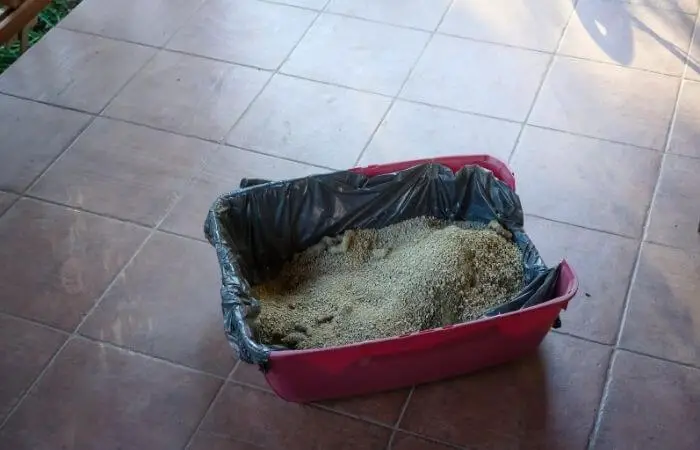
I think we can agree with our cats that dirty litter boxes do not give off a pleasant odour.
Dirty litter trays smell of your cat’s waste, and it’s bad enough as an owner having to clean your cat’s litter box, little own being the one having to use it!
Having a dirty litter box can deter your cat from using their tray altogether, which can be a nightmare for cat owners, as cats may start going to the bathroom on your carpet or under the furniture.
Studies have found that 10% of cats will stop using their litter boxes at some point.
This could be down to several things, such as behavioural issues, using the wrong size litter box or the wrong type of litter, or medical issues, however, having a dirty litter box is another major culprit behind your cat not using their litter box.
To help keep your litter box odour at bay, make sure you scoop the litter tray out at least twice per day to remove any solid waste, and if you use clumping litter, scoop the clumps of urine-soaked litter out too.
You should also wash out the entire box at least once per week to clean any urine that has not been absorbed by the litter and to eliminate any lingering odours.
If you have more than one cat, also make sure that they have a litter box each, otherwise, the nasty smell can concentrate and build up quickly.
Also, avoid using enclosed litter boxes such as top-entry or hooded designs.
Whereas these may trap the nasty smells and stop them from travelling around your home, they will concentrate inside the litter box and make it unpleasant for your cat.
2. Coleus Canina

You may not have heard of Coleus Canina before, but this is a plant with the nickname Scaredy-Cat Plant because of how powerful its cat-repelling abilities are.
Humans also hate the smell of this plant, as it mimics the distinctive scent of skunk spray, which gets worse when someone brushes against it.
Many gardeners will use this plant to keep cats out of their gardens because of how effective it is, but there is one downfall: you too must stomach the smell!
The smell will also get extremely strong and powerful when pruning back the plant, so whereas this may be an effective solution for anyone wanting to keep the neighbourhood cats out of their garden, it does come with a price.
If you are a cat owner, also avoid growing this plant in your garden, both for the sake of you and your cat.


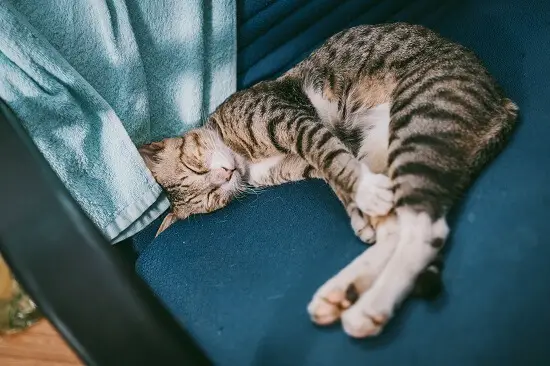
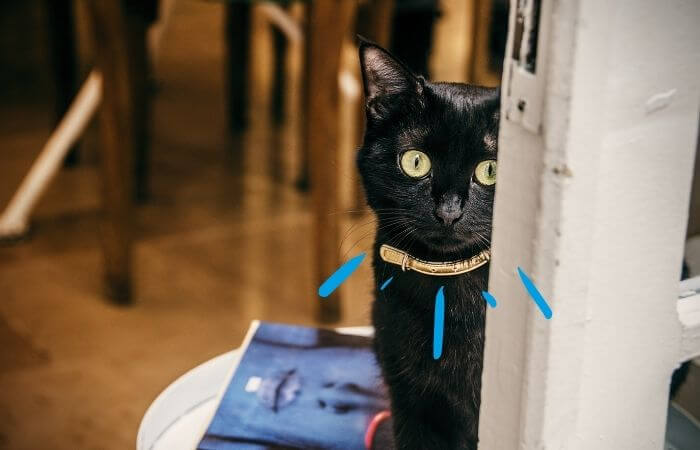


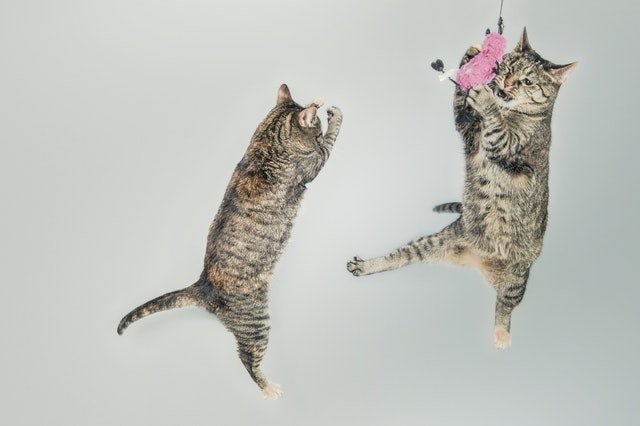

Leave a Comment